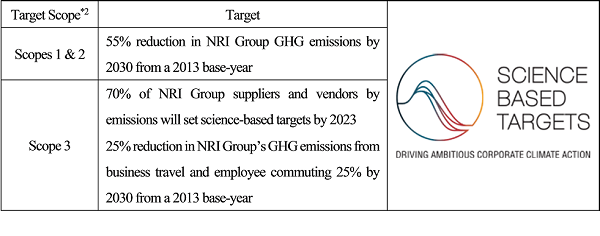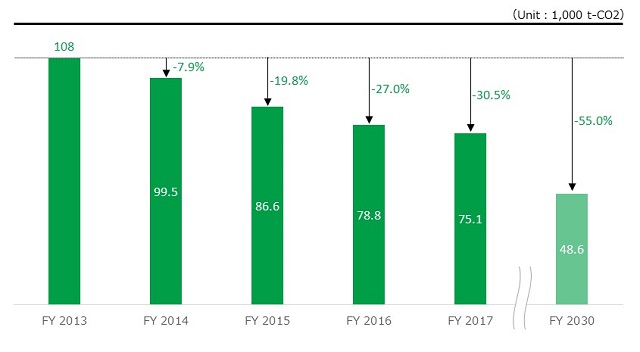TOKYO, September 20, 2018 – Nomura Research Institute, Ltd. (NRI), a leading provider of consulting services and system solutions, announced today that its target for reducing greenhouse gas emissions has been certified by the Science Based Targets (SBT) Initiative *1 , an international environmental initiative, as a science-based reduction target for keeping the increase in global mean temperature below 2˚C from pre-industrial revolution levels. NRI is the 132nd company to receive certification globally, and the 29th in Japan.
■Targets Certified by SBT

One of the NRI Group's materiality *3 issues for sustainability management is "creation of a future, low environmental impact society." The Company has been promoting ongoing activities to reduce the greenhouse gas emissions of society overall. These have included expanding shared online services (green revenues *4 ), which is a CSV (Creating Shared Value) activity for increasing the Company's economic value through solutions to social issues, as well as shifting to new data centers with high environmental performance and relocating the Company's headquarters and other major offices to office buildings with high environmental performance.
To achieve these newly certified targets, the NRI Group will add to its existing initiatives by expanding its use of renewable energy for datacenters, which consume significant energy, introducing carbon pricing *5 , and bolstering supplier engagement initiatives to reduce greenhouse gas emissions across the entire supply chain.
Under its corporate philosophy, "Dream up the future," the NRI Group will continue to contribute to the creation of a sustainable society, working together with a wide range of stakeholders to create new value for the problems society faces, such as environmental problems.
■The NRI Group’s GHG Emissions Reduction (Scopes 1 & 2)

-
*
1
Science Based Targets Initiative: An initiative to promote the setting of science-based targets for reducing greenhouse gas emissions by companies in order to control the increase in global temperature below 2˚C from pre industrial revolution levels. The initiative was established by four organizations: CDP, which is federation of institutional investors promoting disclosure on climate-change countermeasures, the UN Global Compact (UNGC), the World Resources Institute (WRI), and the World Wildlife Fund (WWF).
https://sciencebasedtargets.org/ -
*
2
Scope: Scope of calculation and reporting for a company's greenhouse gas emissions
Scope 1: Direct emissions such as fuel combustion
Scope 2: Indirect emissions such as arise from the use of electricity, heat, and steam
Scope 3: Indirect greenhouse gas emissions other than Scopes 1 and 2, for example, from manufacturing in the supply chain, employee transportation, or business trips -
*
3
Materiality: Materiality is a priority issue to be addressed as part of corporate sustainability management.
NRI has specified the following four materiality issues in its corporate sustainability management.- Creation of a future, low environmental impact society
- Provision of opportunities for all kinds of professionals to take on challenges
- Compliance with laws, regulations and risk management to increase trust from society
- Provision of NRI quality to support safe and security information society
-
*
4
Green revenue: At a time when IT is seeing more widespread use due to significant progress in digital technologies, the growing power consumption has become a cause for concern in the IT industry. In response, NRI has been engaged in a strategy to curb power consumption of the entire value chain, including clients by utilizing IT. NRI's shared online services, provided to a variety of industries and sectors, intend to streamline and raise the productivity of clients' operations and social systems. The usage of these services leads to drastically reduced environmental impact. When multiple companies use a single system jointly, they can markedly reduce power consumption, greenhouse gas emissions and costs, more so than when each company independently developed their own system. For this reason, NRI treats shared online services as green revenue (revenue that contributes to the environment).
-
*
5
Carbon pricing: A scheme for promoting climate change countermeasure by setting a price on carbon emission to create financial incentives to reduce them. Introducing an internal carbon pricing system within a company, enables visualization of the cost effect of internal greenhouse gas emission costs and countermeasures, providing a way to promote significant long-term reduction in a cost effective manner.
-
*
6
NRI's sustainability initiatives
-
News release "55% Reduction in Greenhouse Gas Emissions by 2030 as Compared to 2013"
https://www.nri.com/-/media/Corporate/en/Files/PDF/news/newsrelease/cc/2018/180216_1.pdf -
Website:
https://www.nri.com/en/sustainability -
Integrated Report:
https://www.nri.com/en/ir/library
-
News release "55% Reduction in Greenhouse Gas Emissions by 2030 as Compared to 2013"
Inquiries
Inquiries about Science Based Target Initiative certification
Kenji Honda, Shigeru Fujisawa
Sustainability & Responsibility Group
Nomura Research Institute, Ltd.
E-mail:
41sustainability@nri.co.jp